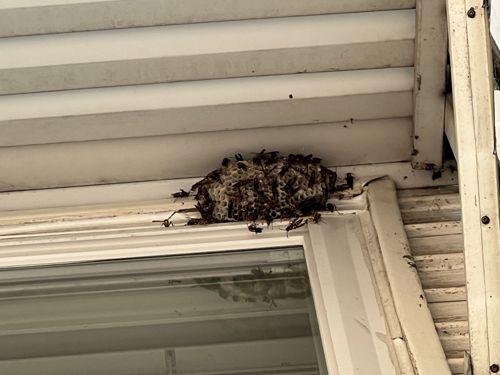Paper Wasp
Scientific Name: Polistes spp.
Order & Family: Hymenoptera, Vespidae
Size: 0.5 to 1 inch (1.2 to 2.5 cm)

Natural Habitat
Paper wasps build their nests in sheltered locations, often under eaves, in attics, sheds, or other protected structures. They prefer areas that are not heavily trafficked but still offer some protection from the elements.
Diet & Feeding
Adult paper wasps feed on nectar, fruit, and other sugary substances. They also hunt caterpillars, beetle larvae, and other insects to feed their carnivorous larvae, making them beneficial predators of garden pests.
Behavior Patterns
Paper wasps are social insects that live in colonies, typically smaller than those of yellowjackets. Their nests are characterized by a single open comb of hexagonal cells, often resembling an upside-down umbrella. They are generally not aggressive unless their nest is disturbed or they feel threatened. Colonies are annual, dying off in colder months, with only fertilized queens overwintering to start new nests in the spring.
Risks & Benefits
Potential risks include painful stings if their nest is disturbed, especially for individuals allergic to wasp venom. Benefits include their role as natural pest control agents, as they prey on many garden pests like caterpillars. However, their nesting habits near human activity can lead to conflict.
Identified on: 9/21/2025